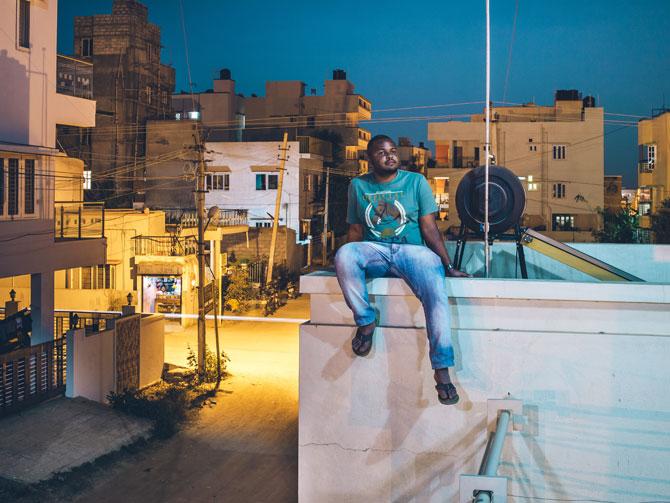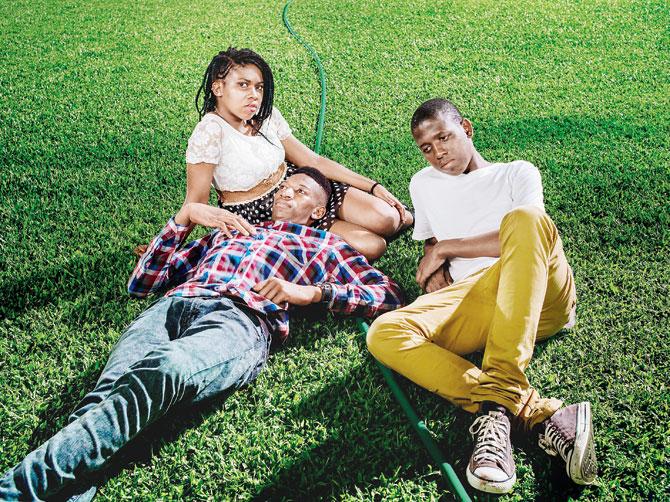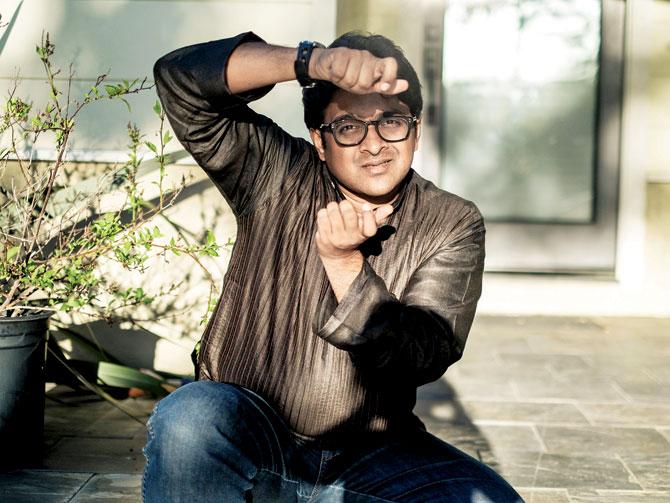The lives of African students in India in the time of racist attacks, told through the lens of Bengaluru photographer Mahesh Shantaram

Mahesh Shantaram has 'made love' to a number of Africans in India. “If you think of a handshake as a way to begin a relationship,” says the Bengaluru-based photographer, “then making a portrait is quite another extreme. It’s like making love.” Looming behind a lens, choosing to shoot in the nights, meeting African students in the outskirts of cities, kindling a love for long exposure shots, Shantaram is deep in the throes of a passion that he picked up earlier this year.
ADVERTISEMENT
 Prosper, a Tanzanian student, lives in Byrathi, Bengaluru, and heads a 200 people-strong Tanzanian community there. His parents are affluent politicians back home, and he came to study in Bengaluru to escape the limelight. Pics/Mahesh Shantaram
Prosper, a Tanzanian student, lives in Byrathi, Bengaluru, and heads a 200 people-strong Tanzanian community there. His parents are affluent politicians back home, and he came to study in Bengaluru to escape the limelight. Pics/Mahesh Shantaram
His series, The African Portraits, took germ in mid-February, after a Tanzanian national was attacked, stripped and allegedly paraded naked by a mob, while about 200 people had gathered around. The woman was all but 21, driving around town in a car with her friends in Bengaluru, one of the nation’s hippest and most cosmopolitan cities, when the incident took place. The woman, while admitted in a hospital, spoke to the press about how she was scared of "every Indian around us".
 Charity and her friends are among 30 scholarship students from South Africa studying in Manipal. She tells Shantaram about how African students are not welcome to sit at the common areas of the hostel lobby, while exchange students from the Netherlands are never chased away
Charity and her friends are among 30 scholarship students from South Africa studying in Manipal. She tells Shantaram about how African students are not welcome to sit at the common areas of the hostel lobby, while exchange students from the Netherlands are never chased away
The attacks show no sign of dying down. Last week, a 23-year-old Congo national was bludgeoned to death in South Delhi after a tiff with some men over hiring an auto-rickshaw. Following this, African diplomats boycotted this year’s Africa Day celebration while minister of External Affairs Sushma Swaraj called for urgent action, stating that "such [attacks] against foreign nationals embarrass the country."
"We are a racist nation. We have a discriminatory attitude towards everyone, from Dalits to people from the North East. I had earlier heard of incidents in which African nationals were targeted across India, but this incident hit home,” says Shantaram, 38. Following the attack on the Tanzanian student, Shantaram turned to familiar vents; he turned to social media, changed his profile as a mark of protest and so on. But, social media outrage and its apparent passivity weren’t enough. The African Portraits, so far a collection of 14 photographs and accompanying stories published online using Adobe Slate, began thus.
 Mahesh Shantaram
Mahesh Shantaram
A study of Africa
With The African Portraits, Shantaram, a documentary photographer practising for the last decade, has turned to portraiture for the first time. His other photography work mainly comprises weddings and politics — two national pastimes — and has been comfortable in Addis Ababa and Cardiff as much as in former Kerala CM Oommen Chandy’s office in Thiruvananthapuram. His current 'art project' (a phrase he hesitates to use) starts off with 'the incident' (a word he draws attention to often) of the Tanzanian girl. It then turns into a digital scroll, dealt with the interest of an anthropologist, a diarist and friend, of Black student life in Bengaluru, Jaipur and Manipal.
The African Portraits began with Shantaram riding out to Soladevanahalli, a village in the peripheries of Bengaluru, boasting of rustic beauty and engineering and IT colleges. These far-flung academic institutions are where most African students live and study, cut off from the young vibe of the city. The reason these colleges have been a preferred academic destination has more to do with dubious advertising than with the students’ financials.
Shantaram had to practically woo these students, meeting them over dinner, till he earned their confidence. South African students were bolder; Nigerian students in Jaipur less so.
To say ‘African’ is to clump together an entire continent, and Shantaram’s work belies its own title. There is Prospero from Tanzania, Charity and her friends from South Africa and Natoya, of African descent, from Jamaica — a pluralism that can only be compared to that of the Indian subcontinent — with a range of emotions.
What The African Portraits is not: A record of suffering of these students. "African students are an extremely vulnerable group. They have nowhere to go to seek redressal for their injustices in a society that is so turned against them," he says, adding, "Now that we have acknowledged that racism exists, let’s have a closer look," he says.
Prosper, for instance, lives in Byrathi, a neighbourhood in Bengaluru that houses a sizeable population of African students. Contrary to popular opinion, Prospero has not escaped Africa for a better life in India. His parents are influential politicians back home, and this sleepy locality of Bengaluru was Prospero’s escape from all the limelight. "These students are from a variety of backgrounds — some are from royal families, some have sold farm lands to fund their studies, and many others are on government scholarships," explains Shantaram. Parents can book a flight for them at the drop of hat and meet the hike in college fees for foreign students.
In his series, as opposed to our conversation, Shantaram doesn’t narrate the many little racist incidents that Prospero and his African peers face daily — the stares of Indian classmates, autodrivers and shopkeepers inquisitive about their sex lives, lecturers warning students not to talk to them, girls shying away from making friends and boys attacking them.
'Everyday Racism', which holds the promise of a trending hashtag, is Shantaram’s concern. "Africans in India face what is known as everyday racism. We need to be aware of their plight because we are all implicated in it. We don’t have to wait for an African 'Nirbhaya' before we start taking it seriously," he says. Shantaram’s guess is that many of these students, friendless and alienated and whose daily solace is derived from calls to their families, are on the verge of depression — a concern as great as the attacks on them.
Shantaram lived for almost a couple of years in Washington DC, USA, before turning to photography and returning to India. Was he ever a victim of racism in the USA? "Yes, from an Indian," he says.
 Subscribe today by clicking the link and stay updated with the latest news!" Click here!
Subscribe today by clicking the link and stay updated with the latest news!" Click here!






